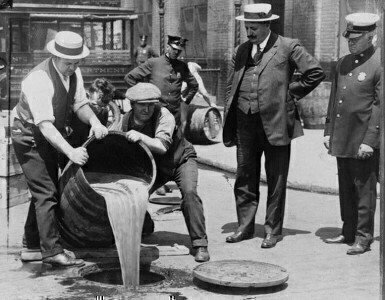It was on this day in 1919 that the Constitution gained a new amendment. However, the 18th Amendment, which made Prohibition the law of the land, had a short shelf life, since it was repealed in the early 1930s.
Indeed, the 18th Amendment became the first–and so far, only–constitutional amendment to be repealed in its entirety.
Link: Read The 18th Amendment
After 13 years of Prohibition, America had had enough of its “noble experiment” in banning the manufacture, sale, and transportation of intoxicating spirits. Enforcement of the ban had failed. Plus, the potential for revenues from taxes on alcohol and for new jobs in a revived alcohol industry received heightened interest with the onset of the Great Depression. Officially, Prohibition started in 1920 with the Volstead Act and ended in 1933, but it was more than a century in the making, and parts of it are still with us today.
But on January 16, 1919, the “Drys” were celebrating a hard-fought victory in a battle that started in the middle of the prior century.
On that day, Nebraska became the 36th of the 48 states needed to ratify the 18th Amendment.
The Drys were a coalition of interest groups who wanted booze banned as a sacred cause. The Drys included religious groups, suffragettes, and temperance groups such as the Anti-Saloon League and the Woman’s Christian Temperance Union. The key leader of the Drys was Wayne Wheeler, who led the grassroots movement through the Anti-Saloon League. Carry Nation was another prominent Dry.
Technically, the 18th Amendment made it illegal to manufacture, sell or transport “intoxicating beverages.” It was never illegal to consume alcohol.
As the Drys fought to ban booze, a key step was the imposition of a national income tax, to replace taxes on liquor sales. The 16th Amendment was ratified in 1913, providing a clear path to Prohibition
Another constitutional part of the Prohibition battle was the 19th Amendment. This amendment gave women the vote. The Woman’s Suffrage movement had close ties to the Temperance movement, and women were able to vote on a national level starting in 1920.
The end of Prohibition came with its repeal via the 21st Amendment in 1933. That amendment allowed states to control their own liquor laws and it is the only Amendment ever ratified using state conventions as part of the process.
During the Roaring 20s and the Prohibition period, the sale of illegal intoxicating spirits was a huge boom to organized, and unorganized crime. Figures like Al Capone, Owney Madden, Meyer Lansky and Lucky Luciano made headlines, as did the exploits of moonshiners and rum runners.
But there 18th Amendment haters, known as the anti-Prohibitionists, or the Wets, who wanted Prohibition out of the Constitution.
They finally got their way in 1933. Brewers were in the anti-Prohibitionist group, and people like Al Capone definitely weren’t. Democrats Al Smith and Franklin Delano Roosevelt were Wets, and FDR championed the cause after becoming president, as a way to boost the economy.
On December 5, 1933, Ohio, Pennsylvania and Utah voted for ratification of the 21st Amendment, making it official.
“The eighteenth article of amendment to the Constitution of the United States is hereby repealed,” begins the 21st Amendment. These words effectively ended Prohibition.








